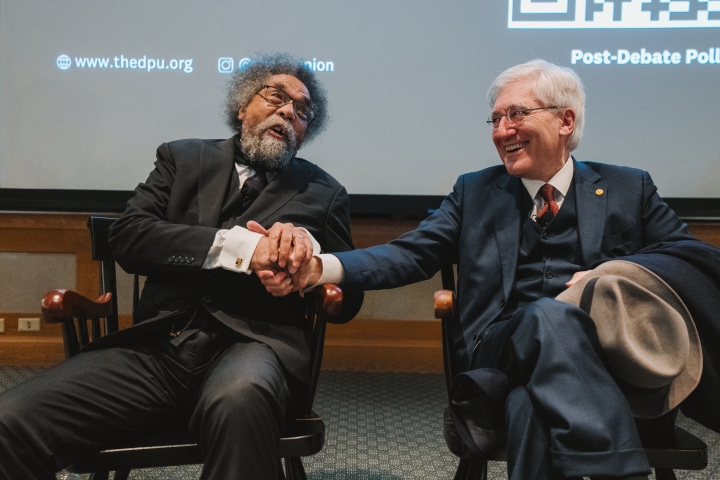
On January 16, self-professed Cornel West and Robert George faced off in a climatic “debate” about the seemingly hotly contested discourse between capitalism versus socialism… a debate with endless room for nuance and a fertile soil for a strawman festival. Indeed, what occurred was not a debate at all, but rather two academics talking past one another (as they often do) while intermittently pausing to remind the audience how much they respect one another.
In the first 10 minutes of the debate, I realized that what I was watching wasn’t going to be a debate at all. Why? Good question. For starters, the two speakers immediately stated their arguments, but failed to argue against each other: Robert George, in his opening statement, discussed the “command economy.” In the next few minutes, Cornel West maintained that he wasn’t arguing for any sort of command economy, but instead spoke in terms of the vague utopia that Marxists always speak about, but can never seem to make reality. Therefore, when the speakers were talking about economics—and it was not often—they were making two arguments that failed to address the sides of the other. Such is why I hesitate to call this a “debate.” Instead of arguing against West about whether any form of socialism can manifest itself into anything other than a command economy, George stuck to his notecards. In fact, I cannot recall one specific instance in which either speaker directly argued against something that the other said.
Given that a self-professed socialist represents one of the sides, it is unfortunate that the pro-capitalist side is represented by a person of questionable conservative credentials. Robert George made several concessions throughout the event, assuring the audience of certain aspects of the economy that he thought ought to be reserved for government control in doing this. This appears to be part of a broader trend of conservative speakers being invited to discussion to create the perception of a politically inclusive community. In reality, these speakers must adhere to a very particular brand of conservatism, one in which support for government intervention in the economy and opposition to President Donald Trump is a necessity. Speaking of which, that was another area of the two speaker’s (many) agreements; everybody had a chuckle as Cornel West made a quip in reference to Donald Trump. Yet another indication that events such as these fail in their attempts to represent American conservatism.
The love in the room between the two speakers was palpable. Truly, the “debate” was interrupted just about every five minutes (keep in mind, we only have an hour) for the two former Princeton professors to express how much they admired and cared for one another. We get it, you don’t hate each other. Frankly, as much as hostility is inhospitable to debate, especially on a college campus, it would not hurt for the speakers to at least represent their many disagreements in front of the audience.
The pre-debate polls showed 43.8% of students claimed that capitalism was the economic system most likely to ensure widespread happiness and prosperity, with 56.2% disagreeing. By the end of the event, the number of people still finding themselves in the pro-capitalism camp had fallen to 35.7%.
I was left scratching my head at such a shift in support: how could so many have changed their minds if there was no debate between the two professors? My conclusion (the only logical one) is that a portion of the anti-capitalism portion of the audience was dishonest in their original answering of the question, so as to portray Mr. West as the more adept debater

They seem to have a buddy gimmick with a thick layer of civility icing.
I saw them on Margaret Hoover’s “Firing Line.”
I’m all for civility. But how about a real debate?
The American college lacks accountability and focus due to maladapted corporate structure and government meddling.